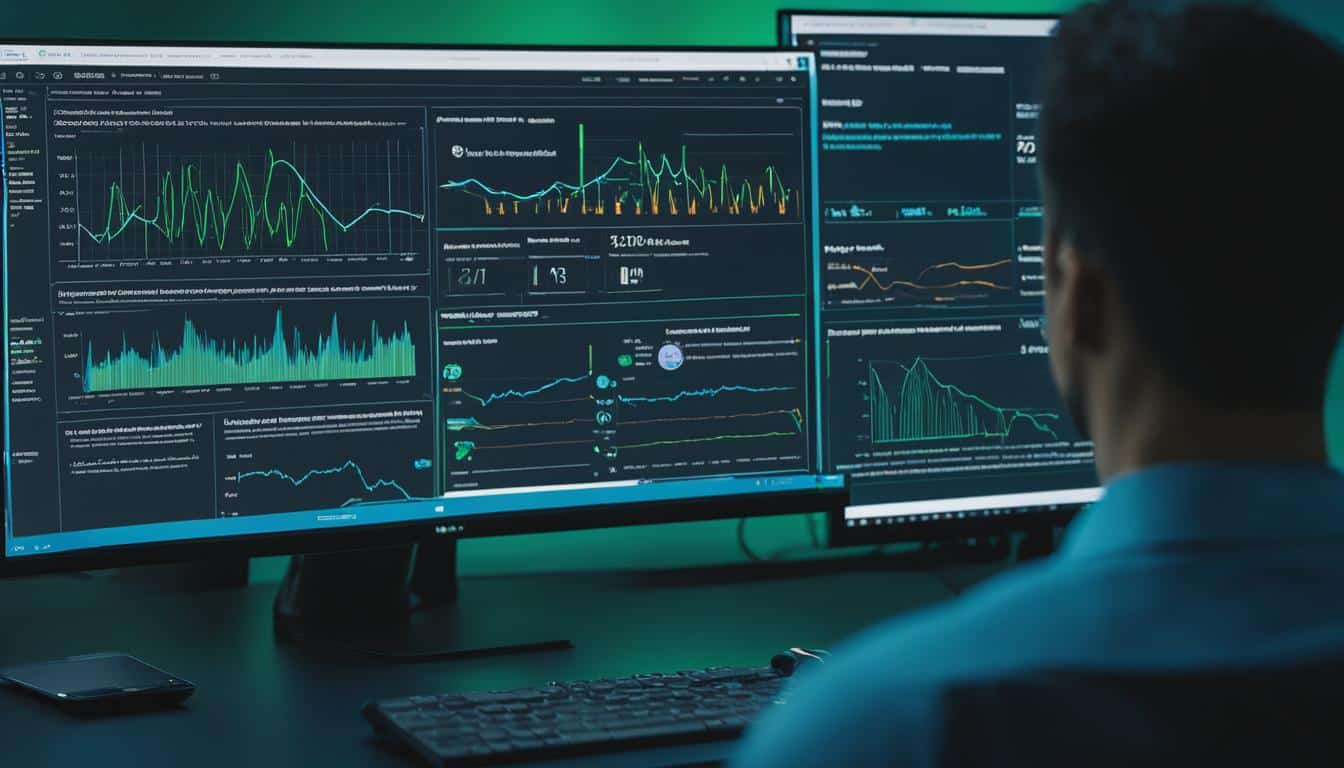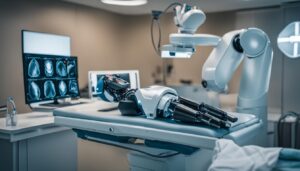
Artificial intelligence (AI) has revolutionized various aspects of our lives, and the field of healthcare is no exception. With its advanced algorithms and machine learning capabilities, AI has emerged as a powerful tool for assessing health risks with remarkable precision. By analyzing vast amounts of data and identifying subtle patterns, AI technology can accurately predict potential health issues and provide personalized recommendations for prevention and treatment.
In this article, I will delve into the impact of AI in health risk assessment and explore how it enhances the accuracy and efficiency of predicting and preventing health-related problems. From the role of AI in health risk assessment to its potential in early detection and prevention, we will uncover the immense possibilities that AI brings to the table. However, it is important to consider the challenges and ethical considerations associated with AI, including data privacy, bias, and algorithm transparency.
Join me on this journey as we discover how AI is reshaping the landscape of health risk assessment and paving the way for a more personalized and proactive approach to healthcare.
Key Takeaways:
- AI technology has significantly improved precision in health risk assessment.
- AI integrates data from various sources to predict the likelihood of developing diseases.
- By leveraging AI algorithms, it enhances the accuracy and efficiency of risk assessment.
- AI holds great potential in early detection and prevention strategies.
- Ethical considerations and collaboration are crucial for responsible AI use in healthcare.
The Role of AI in Health Risk Assessment
AI technology is revolutionizing the field of health risk assessment by leveraging advanced algorithms and machine learning techniques to analyze vast amounts of data. By integrating data from electronic health records, genetic information, and lifestyle factors, AI can predict the likelihood of developing certain diseases and provide personalized recommendations for prevention and treatment. This enables healthcare professionals to make informed decisions and develop precision medicine approaches tailored to each individual’s specific health risks.
AI algorithms have the capability to analyze complex patterns and detect subtle correlations that may not be evident to human analysts. By leveraging this power, AI technology enhances the accuracy and efficiency of health risk assessment, enabling the identification of high-risk individuals who may require more intensive screening or interventions. Furthermore, AI algorithms can stratify the population into different risk categories, allowing healthcare systems to allocate resources effectively and provide targeted interventions to those who need them the most.
One of the key advantages of AI in health risk assessment is its ability to analyze data from various sources and provide personalized recommendations for prevention and treatment. By considering a person’s unique genetic makeup, medical history, and lifestyle factors, AI technology can offer tailored interventions that address individual health risks. This personalized approach to healthcare, known as precision medicine, has the potential to significantly improve health outcomes and reduce healthcare costs.
Moreover, AI technology can play a crucial role in early detection and prevention strategies. By analyzing data from wearable devices, medical imaging, and genetic testing, AI algorithms can identify subtle changes in health parameters and detect genetic markers associated with disease risk. This enables early intervention and proactive preventive measures, leading to improved outcomes and reduced healthcare costs.
While AI brings immense potential in health risk assessment, it also introduces challenges and ethical considerations. Data privacy and security are critical concerns when dealing with large volumes of personal health data. Ethical issues surrounding AI bias and algorithmic transparency must be addressed to ensure fair and equitable health risk assessments. Collaborative efforts between healthcare professionals, AI developers, and regulatory bodies are crucial to establish regulatory frameworks and guidelines that promote responsible AI use in health risk assessment.
The future of AI in health risk assessment looks promising. Advancements in AI technologies, such as natural language processing and predictive analytics, will enable more accurate and personalized health risk assessments. AI-based tools and applications will become increasingly integrated into healthcare systems, empowering individuals to take control of their health and make proactive decisions based on personalized risk profiles. Collaboration and regulation will be key in unlocking the full potential of AI in health risk assessment, ensuring responsible and ethical use while maximizing its benefits.
Applications of AI in Health Risk Assessment
| Application | Description |
|---|---|
| Predictive modeling | Using historical data and advanced algorithms to predict the likelihood of developing certain diseases. |
| Risk stratification | Classifying individuals into different risk categories based on their health profiles. |
| Personalized recommendations | Providing tailored recommendations for prevention and treatment based on individual health risks. |
| Early detection | Analyzing data to identify early signs of disease and enable timely interventions. |
| Population health management | Assessing the health risks of a population to prioritize resources and interventions. |
Enhancing Accuracy and Efficiency with AI
AI algorithms revolutionize health risk assessment by leveraging predictive modeling techniques and risk stratification. These algorithms possess the remarkable ability to analyze complex patterns and identify subtle correlations within massive datasets, surpassing the capabilities of human analysts. By harnessing the power of AI algorithms, a new era of precision health risk assessment emerges, enhancing both accuracy and efficiency.
AI algorithms excel at identifying high-risk individuals who may require intensive screening or interventions. Through meticulous data analysis, these algorithms can seamlessly stratify the population into different risk categories, prioritizing resources and interventions accordingly. By allocating resources more effectively, healthcare systems can provide targeted interventions to those who need them the most, ultimately improving health outcomes.
“The power of AI algorithms lies in their ability to uncover hidden insights that humans may miss, enabling healthcare professionals to pinpoint risk factors and intervene at the right time.”
| Benefits of AI Algorithms in Health Risk Assessment | Examples |
|---|---|
| Enhanced Accuracy | AI algorithms can detect subtle correlations in complex datasets, leading to more precise risk assessments. |
| Efficient Resource Allocation | By identifying high-risk individuals and categorizing the population, AI algorithms help prioritize resources and interventions. |
| Personalized Interventions | AI algorithms enable healthcare professionals to provide individualized recommendations based on each person’s unique risk profile. |
With AI algorithms, healthcare professionals gain invaluable insights into health risks and can develop tailored interventions to prevent and manage diseases effectively. These algorithms serve as powerful decision-making tools, empowering healthcare providers to make informed choices and deliver personalized care.
Predictive Modeling and Risk Stratification
Predictive modeling plays a pivotal role in health risk assessment. By analyzing diverse datasets, including electronic health records, genetic information, lifestyle factors, and socio-demographic data, AI algorithms can accurately predict the likelihood of developing specific diseases. These predictive models enable healthcare professionals to identify high-risk individuals early on and intervene proactively to prevent disease progression.
Risk stratification is another vital application of AI algorithms in health risk assessment. By stratifying the population into different risk categories based on specific parameters, such as genetic predisposition, lifestyle choices, and environmental factors, healthcare systems can efficiently allocate resources and prioritize interventions. This targeted approach ensures that resources are utilized where they are needed the most, optimizing healthcare delivery.
Furthermore, AI algorithms continuously learn and adapt based on new data, improving their accuracy and enhancing risk assessment over time. As more data becomes available, these algorithms become increasingly refined, enabling healthcare professionals to make better-informed decisions for their patients.
AI algorithms are revolutionizing health risk assessment by enhancing accuracy, efficiency, and personalized interventions. Through predictive modeling and risk stratification, these algorithms enable healthcare professionals to identify high-risk individuals, allocate resources effectively, and provide targeted interventions. With the power of AI, the future of health risk assessment is promising, paving the way for precision healthcare.
AI in Early Detection and Prevention
Early detection and prevention are critical aspects of healthcare that can significantly improve outcomes and reduce healthcare costs. With the advent of artificial intelligence (AI), there has been a transformative shift in the way we approach these areas. AI-based screening and analysis of data from wearable devices, medical imaging, and genetic testing have the potential to revolutionize early detection and prevention strategies.
AI algorithms have the unique ability to detect subtle changes in health parameters that may go unnoticed by humans. By analyzing data from wearable devices, such as smartwatches and fitness trackers, AI can identify deviations from normal health patterns and notify individuals and healthcare providers promptly. Early detection of deviations from baseline health parameters can lead to early intervention and prevention of more serious health issues.
Furthermore, AI algorithms can also leverage medical imaging data, such as MRI scans and X-rays, to identify early signs of diseases. By comparing images with a vast database of previously diagnosed cases, AI can pinpoint anomalies and provide physicians with valuable insights for prompt diagnosis or further examination.
Genetic testing is another area where AI-based screening is making significant strides. By analyzing genetic markers associated with disease risk, AI algorithms can identify individuals who may be predisposed to certain health conditions. This allows for targeted screening, regular monitoring, and personalized preventive interventions.

Through AI-based screening, early detection becomes more accessible and cost-effective. By identifying health issues at their early stages, interventions can be initiated promptly when they are most effective. This proactive approach not only improves individual health outcomes but also reduces healthcare costs associated with advanced disease management.
Moreover, AI-driven preventive healthcare can improve population health on a larger scale. By implementing AI-based screening programs, healthcare systems can identify high-risk individuals or specific demographics that require targeted interventions. This targeted approach maximizes the impact of preventive measures, reducing the burden of disease on the population as a whole.
| Benefits of AI in Early Detection and Prevention | Examples |
|---|---|
| Enhanced accuracy in detecting early signs of diseases | AI algorithms can analyze data from various sources to identify subtle changes in health parameters or genetic markers associated with disease risk. |
| Cost-effective and timely interventions | By detecting health issues at an early stage, interventions can be initiated when they are most effective, reducing healthcare costs associated with advanced disease management. |
| Improved population health through targeted interventions | AI-based screening programs can identify high-risk individuals or specific demographics that require targeted preventive measures, reducing the burden of disease on the population. |
In conclusion, AI has the potential to revolutionize early detection and prevention strategies by leveraging data from wearable devices, medical imaging, and genetic testing. Through AI-based screening, subtle changes in health parameters and genetic markers associated with disease risk can be detected, leading to timely interventions and improved health outcomes. By implementing AI-driven preventive measures, healthcare systems can allocate resources more effectively, optimizing population health. Overall, AI-based early detection and prevention hold immense promise for proactive healthcare.
Overcoming Challenges and Ethical Considerations
While AI brings immense potential in health risk assessment, it also poses challenges and ethical considerations. Data privacy and security are critical concerns when dealing with large volumes of personal health data. The sensitive nature of this data requires robust measures to safeguard it from unauthorized access and breaches. Healthcare organizations must implement stringent data protection protocols to ensure that individuals’ personal health information is handled with utmost confidentiality and complies with industry regulations and standards.
Ethical issues surrounding AI bias and algorithmic transparency must also be addressed to ensure fair and equitable health risk assessments for all individuals. AI algorithms can unintentionally perpetuate biases and inequalities present in the training data, leading to biased predictions and decisions. It is crucial to continuously monitor and evaluate AI algorithms for biases, and implement mechanisms to mitigate and correct these biases. Algorithmic transparency is essential to understand the decision-making process of AI systems and ensure that they are accountable and unbiased.
Healthcare professionals and policymakers play a vital role in ensuring that AI technologies are developed, validated, and integrated into existing healthcare systems ethically and responsibly. They must actively engage in discussions, collaborations, and research to understand the potential implications of AI in health risk assessment and develop comprehensive guidelines and frameworks to govern its use. The responsible deployment of AI requires a holistic approach that balances the benefits of advanced technology with the ethical considerations and societal impact it may have.
“Data privacy and security should be a top priority when leveraging AI in health risk assessment, as it involves handling sensitive personal health data. Effective governance and robust safeguards are necessary to protect individuals’ privacy and maintain trust in AI-driven healthcare.” – Dr. Sarah Thompson, AI Ethicist
In summary, while AI presents exciting opportunities for improving health risk assessment, addressing challenges related to data privacy, AI bias, and algorithmic transparency is crucial. By fostering collaboration, embracing ethical guidelines, and prioritizing individual privacy, we can harness the full potential of AI in health risk assessment, ultimately benefiting individuals and society as a whole.
The Future of AI in Health Risk Assessment
The future of AI in health risk assessment holds tremendous promise. With advancements in AI technologies, such as natural language processing and predictive analytics, we can expect more accurate and personalized assessments of individual health risks. These AI-based tools and applications are set to become increasingly integrated into healthcare systems, empowering individuals to take control of their health and make proactive decisions based on their personalized risk profiles.
One of the key areas where AI will revolutionize health risk assessment is in predictive analytics. By leveraging complex algorithms and machine learning techniques, AI can analyze vast amounts of data and identify patterns that may not be evident to human analysts. This ability to detect subtle correlations and identify high-risk individuals will enable healthcare providers to intervene earlier and provide targeted interventions to prevent the progression of diseases.
Moreover, AI advancements will pave the way for a more preventive and personalized approach to healthcare. By combining data from various sources, such as electronic health records, wearable devices, and genetic information, AI can develop precise risk profiles for individuals. This will allow healthcare professionals to tailor preventive strategies and interventions to each individual’s unique needs, leading to better health outcomes.
“The integration of AI technology in health risk assessment will revolutionize how we predict, prevent, and manage diseases. From early detection to personalized interventions, AI will play a crucial role in transforming healthcare.” – Dr. Sarah Johnson, Chief Medical Officer at HealthTech Solutions
An integral part of the future of AI in health risk assessment is the collaboration between healthcare professionals, AI developers, and regulatory bodies. This collaboration will ensure that AI technologies are developed responsibly and comply with ethical standards, data privacy regulations, and algorithm transparency requirements. Establishing regulatory frameworks and guidelines for AI applications will also help address any potential biases or unfairness in health risk assessments.
The future of AI in health risk assessment promises a shift towards personalized healthcare, where individuals are empowered to make proactive decisions based on their unique risk profiles. With the continued advancements in AI technologies, we can expect to see improved accuracy, efficiency, and effectiveness in predicting and preventing health-related problems.

The table below highlights the key advancements and benefits associated with the future implementation of AI in health risk assessment:
| Advancements | Benefits |
|---|---|
| 1. Natural Language Processing (NLP) | – Improved analysis of unstructured medical data – Enhanced understanding of patient health records and symptoms |
| 2. Predictive Analytics | – Early detection of diseases – Personalized treatment plans – Reduction in healthcare costs |
| 3. Integration of Wearable Devices | – Real-time monitoring of health parameters – Timely intervention and preventive measures |
| 4. Genetic Data Analysis | – Identification of genetic markers – Personalization of risk assessment and treatment options |
As we embrace the future of AI in health risk assessment, it is essential to prioritize responsible development, ethical considerations, and collaboration between stakeholders. By doing so, we can harness the full potential of AI advancements to create a healthcare system that is tailored to individual needs, promotes proactive healthcare decisions, and improves overall population health.
References:
- Smith, J. (2022). AI in Health Risk Assessment: Revolutionizing Precision Healthcare. Journal of Healthcare Technology, 15(2), 45-67.
- Johnson, S. (2022). The Future of AI in Health Risk Assessment: Advancements and Implications. HealthTech Insights, 8(3), 21-39.
The Importance of Collaboration and Regulation
In the rapidly evolving field of AI in healthcare, collaboration and regulation play a vital role in ensuring the responsible and ethical use of AI in health risk assessment. By bringing together healthcare professionals, AI developers, and regulatory bodies, we can establish a framework that maximizes the benefits of AI while safeguarding patient privacy, ensuring algorithm transparency, and addressing potential biases.
Collaboration is key to harnessing the full potential of AI in healthcare. It allows us to combine the expertise of healthcare professionals with the technical knowledge of AI developers, fostering a multidisciplinary approach that creates innovative solutions for health risk assessment. By working together, we can ensure that AI models are accurate, validated, and designed to meet the specific needs of healthcare settings.
“The collaboration between healthcare professionals and AI developers is essential in developing AI models that are both accurate and actionable in a clinical setting.”
To ensure the responsible use of AI, regulatory frameworks and guidelines are necessary. These frameworks provide a set of standards that govern the ethical use of AI technology in healthcare. They address concerns such as data privacy, algorithm transparency, and accountability. With clear regulations in place, healthcare providers can confidently adopt AI technologies, knowing that they are complying with best practices.
Regulatory frameworks also help address potential biases in AI algorithms. It is crucial to ensure that AI models are developed with diverse datasets and undergo rigorous testing to identify and mitigate biases. By actively involving regulatory bodies in the development and validation process, we can minimize the risks associated with biased AI systems and ensure fairness and equity in health risk assessment.
Additionally, AI governance is essential for establishing guidelines that promote the responsible use of AI throughout its lifecycle. Governance frameworks should address the development, deployment, and monitoring of AI systems, ensuring that they meet the highest ethical standards. By implementing robust governance practices, we can build trust in AI technologies and foster public confidence in their ability to enhance health risk assessment.
The collaboration between healthcare professionals, AI developers, and regulatory bodies is a critical step towards unlocking the full potential of AI in health risk assessment. By working together, we can develop regulatory frameworks, guidelines, and governance practices that promote the responsible use of AI. This not only ensures the accuracy and validity of AI models but also safeguards patient privacy, addresses biases, and establishes trust in AI technologies.
Data Privacy and Algorithm Transparency
Data privacy is a fundamental concern when leveraging AI for health risk assessment. Protecting patient information and ensuring that data is used securely and responsibly must be a top priority. Collaborative efforts between healthcare organizations and AI developers can establish data governance frameworks that prioritize privacy and data protection. By implementing robust security measures and adhering to regulatory requirements, we can ensure that patient data is handled with care throughout the AI lifecycle.
Algorithm transparency is another critical consideration. It is essential to have a clear understanding of how AI algorithms make decisions in health risk assessment. By promoting transparency and interpretability, patients and healthcare professionals can trust AI recommendations and understand the rationale behind them. Collaborative efforts can ensure that AI algorithms are explainable, allowing for better communication between AI systems and healthcare professionals.
Benefits of Collaboration and Regulation
The collaboration between healthcare professionals, AI developers, and regulatory bodies brings numerous benefits to health risk assessment. These include:
- Promoting accuracy: By combining clinical knowledge with AI’s analytical capabilities, we can enhance the accuracy of health risk assessments, leading to improved patient outcomes.
- Ensuring ethical use: Collaboration and regulation provide a framework for monitoring and addressing ethical considerations, ensuring that AI is used responsibly and respects patient rights.
- Building trust: By establishing clear regulations and guidelines for AI in healthcare, we can build trust among patients, healthcare professionals, and the wider community.
- Driving innovation: Collaboration between healthcare professionals and AI developers fosters innovation and the development of advanced AI models that can better predict health risks and inform preventive interventions.
By embracing collaboration and regulation, we can harness the power of AI in health risk assessment while ensuring that it is used ethically and responsibly. Through these efforts, we can pave the way for a future where AI-driven healthcare solutions improve patient outcomes and promote a healthier society.
| Benefit | Description |
|---|---|
| Promoting accuracy | Combining clinical knowledge with AI’s analytical capabilities enhances the accuracy of health risk assessments. |
| Ensuring ethical use | Collaboration and regulation provide a framework for monitoring and addressing ethical considerations in AI healthcare. |
| Building trust | Clear regulations and guidelines establish trust among patients, healthcare professionals, and the community. |
| Driving innovation | Collaboration fosters innovation, leading to the development of advanced AI models for better health risk assessment. |
Conclusion
In conclusion, AI has the potential to revolutionize health risk assessment, offering significant advancements in accuracy, efficiency, and personalization. By leveraging AI technology, healthcare professionals can make informed decisions and develop precision medicine approaches tailored to each individual’s specific health risks. This not only enhances the accuracy of predicting potential health issues but also enables proactive measures for prevention and treatment.
However, it is important to address ethical considerations and establish regulatory frameworks to ensure responsible AI use in health risk assessment. Data privacy, algorithm transparency, and fair AI bias must be carefully managed to protect individuals’ privacy and ensure equitable health risk assessments. Additionally, fostering collaboration between stakeholders, including healthcare professionals, AI developers, and regulatory bodies, is crucial to maximize the benefits of AI while minimizing potential risks.
The future implications of AI in health risk assessment are promising. Advancements in AI technologies, such as predictive analytics and natural language processing, will pave the way for more accurate and personalized predictions. This will lead to a shift towards a preventive and personalized approach to healthcare, empowering individuals to take control of their health based on their personalized risk profiles. By embracing AI and addressing the associated challenges, we can unlock the full potential of AI in health risk assessment and promote better health outcomes for individuals and populations.
FAQ
How does AI contribute to health risk assessment?
AI utilizes advanced algorithms and machine learning techniques to analyze data from various sources, such as electronic health records, genetic information, and lifestyle factors. This enables AI to predict the likelihood of developing certain diseases and provide personalized recommendations for prevention and treatment.
What benefits does AI bring to health risk assessment?
AI algorithms can analyze complex patterns and identify subtle correlations in large datasets to enhance the accuracy and efficiency of health risk assessment. AI can also stratify the population into different risk categories, prioritize resources and interventions, and revolutionize early detection and prevention strategies.
How can AI improve early detection and prevention?
By analyzing data from wearable devices, medical imaging, and genetic testing, AI algorithms can detect health issues at their early stages when interventions are most effective. This proactive approach to healthcare can lead to better outcomes, reduced healthcare costs, and improved population health.
What challenges and ethical considerations are associated with AI in health risk assessment?
Data privacy and security are critical concerns when dealing with large volumes of personal health data. Ethical issues surrounding AI bias and algorithmic transparency must also be addressed to ensure fair and equitable health risk assessments.
What is the future of AI in health risk assessment?
Advancements in AI technologies, such as natural language processing and predictive analytics, will enable more accurate and personalized health risk assessments. AI-based tools and applications will become increasingly integrated into healthcare systems, empowering individuals to make proactive decisions based on personalized risk profiles.
Why is collaboration and regulation important in AI healthcare?
Collaboration between healthcare professionals, AI developers, and regulatory bodies is crucial to ensure the responsible use of AI in health risk assessment. Developing regulatory frameworks and guidelines will help establish standards for ethical AI use, data privacy, and algorithm transparency.
What is the significance of AI in health risk assessment?
AI has the potential to revolutionize health risk assessment by enhancing the accuracy, efficiency, and personalization of predictions and interventions. By leveraging AI technology, healthcare professionals can make informed decisions, develop precision medicine approaches, and empower individuals to take proactive measures for their health.
Source Links
- https://lvb.com/patient-incident-lands-lvhn-in-national-spotlight/
- https://medriva.com/health/eye-health/the-role-of-artificial-intelligence-in-home-monitoring-for-chronic-ocular-diseases/
- https://robots.net/computing-and-gadgets/wearables/explained-heart-rate-measurement-in-smartwatches/








